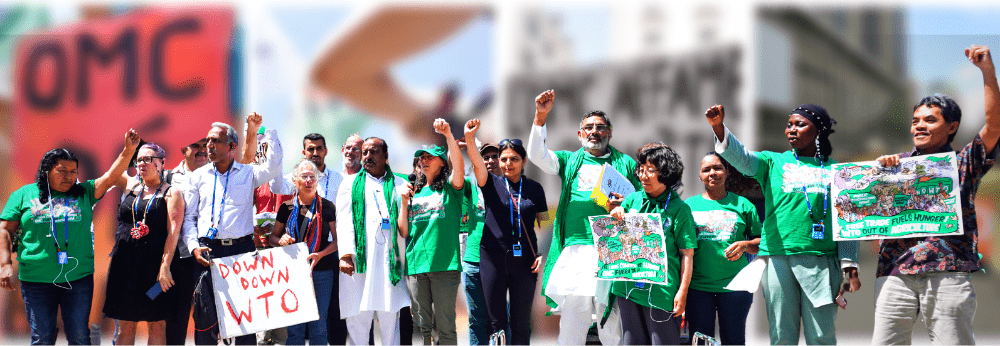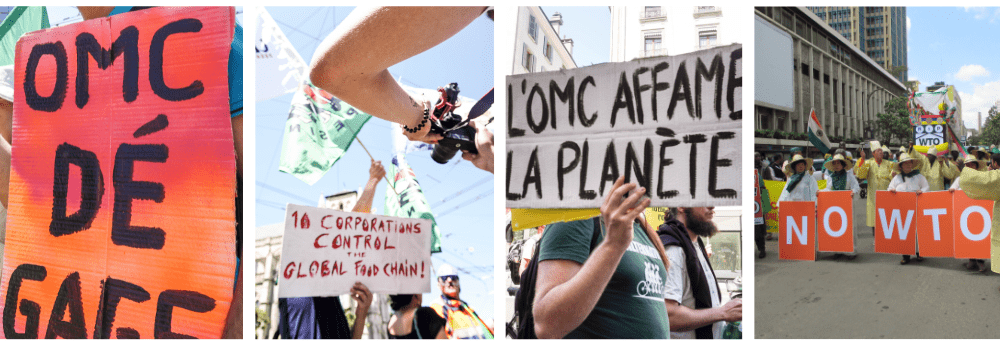La Via Campesina responds to the WTO’s purported plans to set up a ‘Civil Society Council’

Recently, La Via Campesina received a request to participate in a civil society “council” to the WTO executive. After careful consideration, we decided to decline this invitation. Through this open letter, we wish to explain why we believe it is impossible to reform the WTO in a way that is favourable to peasants and, more generally, to the interests of the people.
Since 1995, the WTO has aimed to facilitate and increase the share of international trade in world production and consumption. Compared to the GATT, one of the main changes brought about by the creation of the WTO was to integrate agriculture into this logic of generalized free trade.
As early as 1993, La Via Campesina, as a world peasant movement, was created against this logic of globalization and commodification of agriculture and food. The principles of free-market ideology and the legal frameworks that have governed international trade over the past three decades have deep roots in the history of colonialism. It was clear to the vast majority of peasant organizations around the world that giving priority to international trade over agricultural production for feeding local populations would only accentuate the marginalization of peasant populations, worsen hunger in the world and increase the power of transnational companies.
The Agreement on Agriculture, which came into force in 1995 and was to be applied for a limited period of time, is so unfair that, since then, no agreement has ever been reached between the WTO member states on the agricultural issue. As the title of the late Jacques Berthelot’s book expresses it, “agriculture is the Achilles heel of globalization”, and therefore the eternal Achilles heel of the WTO.
This year, in 2023, we commemorate the 20th anniversary of the tragic death of our brother, friend and comrade Lee Kyung Hae from South Korea who gave his life in Cancun in 2003 to denounce the WTO. In his memory, we call to finally end the WTO and build a new framework for fair international trade based on food sovereignty.
An unfair agreement on agriculture
The Agreement on Agriculture (AoA) is fundamentally unfair. It is the direct result of the 1992 Blair House agreement between the United States and the European Union, which sets out a common strategy for these two actors to the detriment of the other states of the world, and in particular against the interests of the countries of the Global South.
Export subsidies are certainly limited in principle (although in reality they continue via various mechanisms), but replaced by direct support from the US and the EU to farmers. However, this direct aid, whose very purpose is to maintain the competitiveness of US and European production on international markets, is classified in the “green box” of so-called “non-distorting” support. Most countries in the South do not have the budgetary capacity to distribute such levels of public aid to farmers: the green box is reserved for rich countries that control international monetary production. On the contrary, market regulation tools and in particular agricultural price support measures (tariffs, supply management mechanisms, MSP minimum support prices, public stockholding, etc.), which are more accessible to poor countries, are classified in the amber box and are therefore subject to significant reductions. The AoA is an agreement tailored to the United States and the EU, against the countries of the South. African, Asian and Latin American countries have very good reasons to denounce this unfair agreement.
From the point of view of peasants in the South and the North, this agreement has had disastrous consequences, as we predicted in 1993. All over the world, the power of transnational companies has increased and they have succeeded in increasing their margins to the detriment of the peasants, who have received only a minimal share of the value of their production. In the South, these companies have also grabbed more and more land, water sources and seeds, to the detriment of peasant communities and often in a violent way, based on the WTO agreements, but also on the structural adjustment programmes imposed by the IMF and the World Bank. In the North, farmers on small and medium-sized farms have received little or no direct aid (80% of farms in the EU are smaller than 10 hectares), but they have suffered from the fall and volatility of agricultural prices following the dismantling of market regulation tools (the end of milk quotas for example). They were put in competition with large farms that received tens of thousands of dollars or euros in public subsidies.
More generally, the AoA has been a disaster for people and the environment. Food supply chains have become globalised: when major shocks occur on international markets and prices soar with financial speculation, indebted countries that have become dependent on imports to feed their populations are extremely vulnerable, as we saw at the time of the 2008 crisis, but also currently. Thus, far from the declarations of the 1996 food summit which promised to end hunger through international trade, the opposite is happening. Hunger is increasing, fuelled by poverty and social inequality. Rural populations are driven out of their territories by land grabbing and lack of agricultural income and migrate to cities or neighbouring countries. Agrarian countries are becoming poorer. Huge industrial monocultures for export are replacing the diverse mixed farming methods that used to produce healthy food for local populations. Pesticides, synthetic fertilisers and GMO seeds are proliferating and polluting the water, soil and air, seriously affecting the health of rural populations.
This is the result of almost 30 years of AoA: green deserts, hunger and a dying countryside.
La Via Campesina’s historic struggles for food sovereignty
On the contrary, since 1996 we have affirmed the need to build and defend food sovereignty, i.e. the right of peoples to decide on their agricultural and food policies, without dumping on other peoples.
Food sovereignty includes the right of peoples, and therefore of States, to distribute land and water use rights not according to a so-called “law of the market”, but according to the general interest. It includes the right of states to put in place public policies to regulate the market so as to guarantee agricultural production in line with the needs of the population and at stable prices. It considers the importance of production methods, and in particular agroecology, to protect the health of territories and populations. It gives priority to local production and consumption of food, not to exports of agricultural goods. It puts people, especially small-scale food producers, and in particular women and youth, at the centre, rather than the interests of transnational companies and financial actors.
For years, we have seen that the WTO continues to be a powerful instrument for the destruction of people’s food sovereignty. The WTO is used by rich, agro-exporting countries to denounce and criminalise policies that aim to support peasant agriculture, regulate agricultural markets and stabilise food prices for people. For example, the constant denunciation via the WTO of public storage is a shame. In March 2022, we were given access to WTO documents that contained threats to use the dispute settlement body against Egypt, which expressed a pressing need to increase its public stocks to ensure food for its population in the face of the sudden rise in prices on international markets. Similarly, the group of African countries, India, China, South Africa, the G33 and the ACP group have been expressing the need to allow public storage to support their local food production and fight hunger for many years, and they are not being heard.
Food sovereignty is not compatible with the AoA, nor with the very principles of the WTO. This is why we have always denounced the AoA and said “Down Down WTO”.

NO to a reform of the WTO, YES to multilateral negotiations outside the WTO to create an International trade framework based on food sovereignty
You invite us to participate in a council to “reform the WTO”. But food sovereignty can never be achieved by the WTO, whose very purpose, the globalisation of international trade and the accentuation of “free trade”, is contrary to food sovereignty. So we are obliged to refuse this invitation. Based on information gathered from multiple sources, La Via Campesina has come to understand that even within the WTO, there is resistance to the Director General’s (DG) unilateral establishment of such bodies, particularly from developing countries. It appears that this initiative by the DG is driven by business groups who have evident vested interests in a business advisory council. Consequently, it seems that the creation of a CSO council is merely a superficial gesture. We strongly reject it!
The last time you invited us to the negotiation table (and we refused) was in 2005, following the failure of the negotiations in Hong Kong, in the face of an existential crisis of your organisation that since then has never been resolved. This crisis is now reaching a climax. You are trying to save your organisation by launching yet another reform process, but without ever calling into question the very philosophy of the WTO and the reason for your failure. Agriculture remains your “Achilles heel”.
We, the global peasant movement, do not want to negotiate with the WTO. We want the Agreement on Agriculture repealed and we want the WTO to give us a breath : we want the WTO out of agriculture.
The demise of the WTO is inevitable. Your organization has not only demonstrated its futility, but more importantly, its detrimental impact. Faced with the immense challenges facing humanity – world hunger, the climate crisis, wars, inflation, social inequalities, the collapse of biodiversity, pandemics, etc. – the responses you propose are making the crises worse.
More and more states are realising that no solution will be found with the institutions that have been the Trojan horses of Western neo-liberalism, the WTO, the IMF and the World Bank, for it is these institutions that have led to the current disaster. However, these states have not yet found the means to set up alternative institutions to meet their needs. “The old world is dying, the new world is slow to appear”
We fully understand the need for states not to be excluded from the possibility of participating in international trade. The situation of states that are subject to unilateral unjust sanctions excluding them from international trade shows the importance of a fair framework for agricultural trade in particular. La Via Campesina does not defend autarky, but food sovereignty.
Thus, we call on states not to waste time in sterile negotiations at the WTO around a hypothetical “reform” that has never led to anything for more than 20 years. We invite states, and in particular the countries of the Global South, to sit around the table to negotiate a new framework for fair and inclusive international trade based on food sovereignty. These negotiations could take place in any space that respects genuine multilateralism where all states are truly equal and where the voice of civil society organisations and in particular small-scale food producers will be heard and taken into account, for example at the FAO or UNCTAD.
We, La Via Campesina, commit ourselves to work for this new international framework, just as we did for the United Nations Declaration on the Rights of Peasants and Other Rural Workers (UNDROP). We place ourselves under the good auspices of our brother, friend and comrade Lee Kyung Hae to carry out this necessary task.
Globalize the Struggle, Globalize Hope !
Faced with Global Crises, We Build Food Sovereignty, to Ensure a Future for Humanity !
La Via Campesina
29 May 2023
For press enquiries, write to press@viacampesina.org
